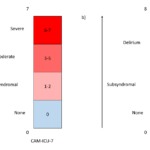In our October 10, 2023 mentoring session, Drs. Eyal Kimchi and Gen Gen Shinozaki discussed the evolving research and clinical roles of EEG in delirium assessment across different patient settings.
Tag Archives: Delirium
Investigator of the Month (November 2023): John Newman, MD, PhD
John Newman, MD, PhD is a geriatrician, translational scientist, and educator at the Buck Institute for Research on Aging and in the Division of Geriatrics at UCSF. As a physician-scientist, Dr. Newman’s goal is to use our growing understanding of fundamental mechanisms of aging to better understand the pathophysiology of delirium and ultimately create new […]
Using Qualitative Approaches to Understand the Subjective Experience of Postoperative Delirium
Contributed by Kelly Atkins, DPsych (Clin Neuro), Melbourne Medical School, University of Melbourne. Our Research Question Postoperative delirium is the most common adverse outcome affecting older adults after surgery and is associated with a cascade of negative outcomes1, 2. While research activity in the field of postoperative delirium has exploded, the subjective experience of postoperative […]
Dr. Inouye named as JAMA Internal Medicine editor in chief
NIDUS Multi-PI Dr. Sharon Inouye was recently appointed as the editor in chief of JAMA Internal Medicine. Dr. Inouye’s appointment will officially begin on July 1, 2023. “I am truly excited to become the next editor in chief of JAMA Internal Medicine. I hope to build on the tremendous foundation provided by Dr. Rita Redberg […]
What is the preferred delirium screening tool in the post-anesthetic care unit?
Contributed by Rami K. Aldwikat1, Elizabeth Manias2, Alex C. Holmes3, Emily Tomlinson1 and Patricia Nicholson1 1 School of Nursing and Midwifery; Centre for Quality and Patient Safety Research in The Institute for Health Transformation, Geelong, Vic, Australia 2 School of Nursing and Midwifery, Monash University, Clayton, Victoria, Australia 3 Department of Mental Health, The Royal […]
Using Limited Lead Rapid Response EEG to Detect Delirium: A Proof-of-Concept Study
Malissa Mulkey, PhD, APRN, CCNS, CCRN Post-Doctoral Research Fellow, Indiana University Medical Center, Indianapolis, IN Based on the Diagnostic and Statistical Manual for Mental Disorders-Version 5 (DSM-V) delirium is defined as encompassing a reduction in attention, impairment in both cognition and memory and awareness.1 Historically, due to the high prevalence in the intensive care setting, […]
Do more complex brain electrical signals protect against postoperative delirium?
Leah Acker, MD, PhD, Assistant Professor of Anesthesiology, Duke University Medical Center, Durham, NC Outside of the delirium field, less complex physiological output signals often are associated with increased risk of geriatric syndromes. For example, an increased risk of falls is associated with less complex musculoskeletal adjustment movements.1 Overall, less complex physiological signals are associated […]
Cognitive Prehabilitation to Prevent Postoperative Delirium
Contributed by Brian O’Gara MD MPH Department of Anesthesiology, Beth Israel Deaconess Medical Center, Boston, MA Postoperative delirium occurs in 15-50% of older surgical patients, and increases the risk of postoperative complications, hospital mortality and long-term cognitive dysfunction.1 Hospital -based multicomponent interventions can prevent postoperative delirium, but these approaches are only 30-40% effective.2 Therefore, there is […]
Studying Delirium in the Neurocritical Care Unit: Improving Detection and Outcomes in Patients with Stroke
Michael Reznik, MD Assistant Professor of Neurology & Neurosurgery. Brown University, Alpert Medical School I’ve been interested in brain science, consciousness, and cognition for as long as I can remember, and it was through the lens of these interests that I opted to pursue a career in neurology. I found myself especially interested in patients […]
Discordance between ICDSC and CAM-ICU-7 as measures of delirium severity in the ICU
Karla D. Krewulak PhD and Kirsten M. Fiest PhD Department of Critical Care Medicine, University of Calgary, Calgary, AB, Canada Determination of delirium presence or absence may no longer be sufficient when tools exist to measure a delirium score which may be used to estimate delirium severity. Measurement of delirium severity has been identified as […]









